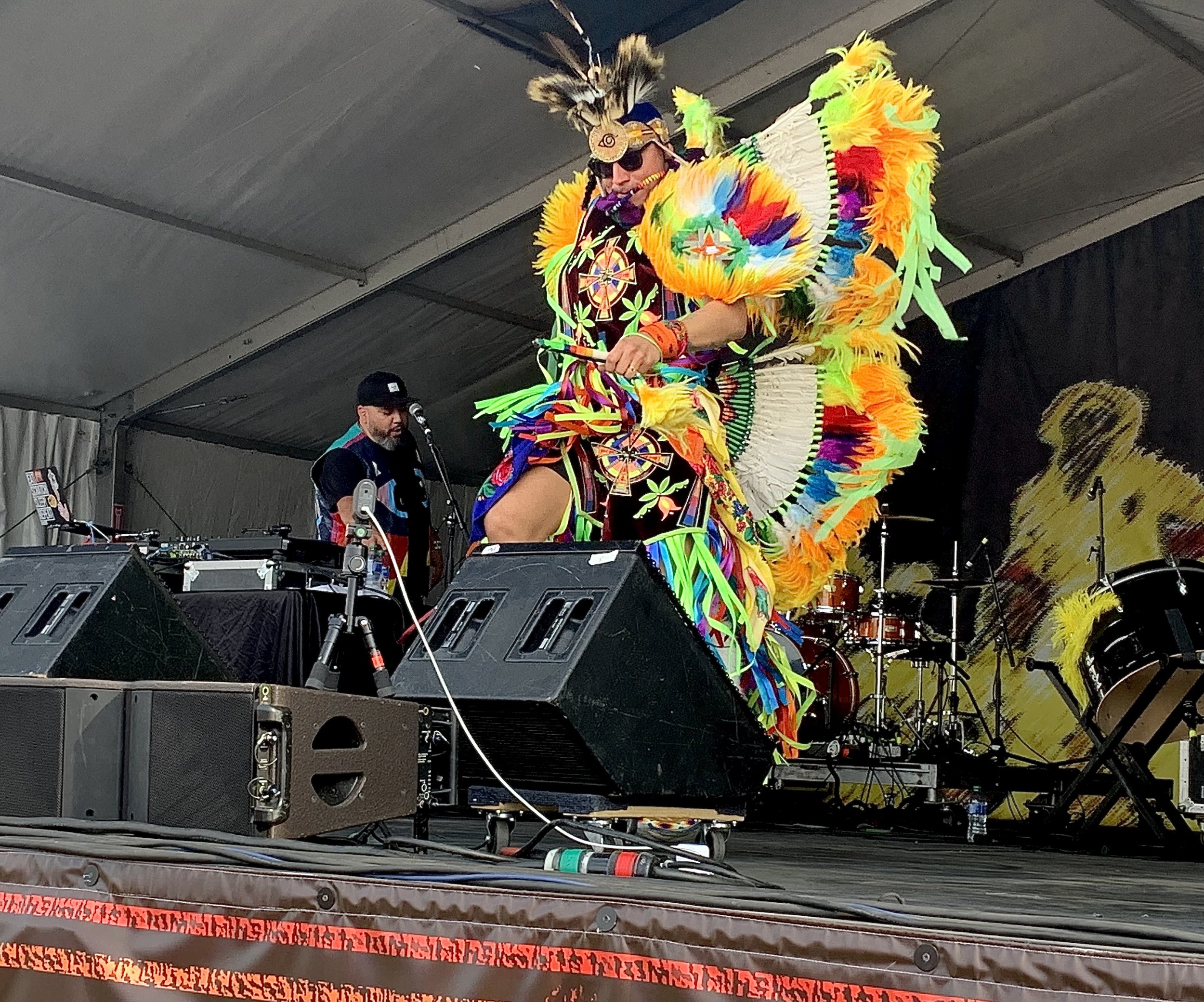Staples, Jones Shine Thursday at Jazz Fest

Age has made both artists more interesting, and our highlights for Friday at the festival.
When people asked me what I thought of The Rolling Stones playing Jazz Fest, I said that I couldn’t get excited to see a bunch of 75-year-old men play rock ’n’ roll. Mavis Staples and Tom Jones’ sets Thursday at Jazz Fest forced me to rethink my disinterest because I enjoyed what I saw from both of them. I didn’t care about the Stones for the same reason that a number of sets slated for the Acura Stage leave me cold—because the narrative is largely finished and we’re there to re-live days gone by.
But the later phases of Jones and Staples’ careers have taken interesting turns that made compelling music even though both are in their 70s. Jones’ love of R&B has always been present, but in his heyday he sang it and everything else like a playboy. Whatever soul he brought to a song came in the form of a robust theatricality, and the fact that he got credit for any was a product of context. Few television stars of the ‘60s and ‘70s so clearly liked the blues and R&B, and few sang it as well or as enthusiastically as he did. It’s telling that he admitted in an interview that his default song choice when he didn’t know what else to do was “Great Balls of Fire.” It was the voice of a guy without any obvious interior life.
When The Art of Noise released its version of “Kiss” with Tom Jones in 1988, part of the fun of the song was the way it built an electronic musical architecture around that voice, and it used Jones almost as a sound effect or a sample—an artifact from another day Frankensteined back to life by the recording technology of the day. “Kiss” was a hit and Jones was great on it, but he seemed like a novelty on the song as the value system his leering performance evoked seemed retro even then.
“Kiss” was 30 years ago, and time has taken some of the roundness out of his voice. He still has plenty of authority, but Jones doesn’t explode into a song like he once did. He knows it and indirectly addressed it when he covered Leonard Cohen’s “Tower of Song” in the show on the Gentilly Stage and in 2012 on Spirit in the Room. The line “I was born with the gift of a golden voice” lands differently for Jones than it did for Cohen, but the opening lines—“Well, my friends are gone and my hair is grey / I ache in the places where I used to play”—don’t.
He’d eventually get to the hits, but he started the show on a gospel note. His Praise & Blame from 2010 is his version of gospel, and his openers—“Burning Hell” and a “La Grange”-like “Run On”—both came from it. Between the two, he talked about how he and Elvis Presley used to sing songs like these backstage in Las Vegas in the ’60s, but it’s unlikely the two gave the songs rock ’n’ roll edges like he did Thursday. Jones didn’t over-amp the salvation drama the way he once would have, nor did he take to the pulpit and shout the songs out. No, he simply gave them their intense due, let the guitars drive, and made sure he had something in the tank for later.
Make no mistake—his voice remains more powerful than most and he’s still a rogue, but dealing with aging has made him a more compelling rogue.
Mavis Staples’ career has followed a different arc. The Staples Singers’ gospel-folk made her a star, particularly when the Staples moved to Stax Records and recorded the songs that made her reputation. That stretch ran from 1971 and “Respect Yourself” through 1975 and “Do It Again,” after which time disco and changing times left The Staple Singers adrift, so much so that they changed their name to The Staples. Mavis’ rich, profoundly human voice remained a remarkable instrument, but it wasn’t always used to best advantage. On 1984’s Turning Point, the lead track was the Chic-lite “This is Our Night,” but it also included a cover of Talking Heads’ “Slippery People” that tapped obliquely into the effort to make connections that threads through the Staples Singers’ material, so much so that Staples returned to it for the Live in London that she released earlier this year. (On 1985’s The Staple Singers, they revisited Talking Heads less successfully for a cover of “Life During Wartime”.)
When Wilco’s Jeff Tweedy helped her get back to her folk-gospel-soul in 2010’s Have a Little Faith, Staples had a career renaissance. The limits that age started to impose on her voice gave her performances an authority and wisdom that comes from experience. She returned to Civil Rights-era folk songs and gospel songs with a surer musical footing than she demonstrated for a couple of decades, and she seemed to enjoy herself. One change that played out Thursday in the Blues Tent is a return to the classic sound of earlier Staples Singers’ songs with a throbbing, insistent bassline that gives Mavis plenty of room to express herself. She revisited The Buffalo Springfield’s “For What It’s Worth,” which The Staples Singers recorded for Stax in 1967, and that bass substrata made it and much of the set powerfully funky.
Staples got a little help from Trombone Shorty, who joined her for a song and reminded you just how musically intelligent he is. When the time came for his solo, he lit into with the biggest, brassiest note he could manage. He matched his intensity to hers and ratcheted up the excitement from there. The moment didn’t require elaborate melodic construction, so he didn’t offer it. Instead, he rode the energy and fueled Staples in the process.
Staples clearly had limits. She sat down when she could, and did so more as the set went on. But after the classic “Reach Out, Touch a Hand,” she finished with “No Time for Cryin’,” around which she weaved a political riff. We need a change, she said. “I’m gonna have to run for president,” she enthusiastically announced. “Would y’all vote for me?” The answer was a resounding yes.
Our highlights for Friday at Jazz Fest:
Leyla McCalla
12:20 p.m., Sheraton New Orleans Fais Do Do Stage; 3:35 p.m., Cultural Exchange Pavilion World Journey
We recently interviewed Leyla McCalla about the community she discovered while pursuing Kreyol culture
Cedric Watson et Bijou Creole
1:30 p.m., Sheraton New Orleans Fais Do Do Stage
Kamasi Washington Interview by Michael Gourier
1:30 p.m., Allison Minor Music Heritage Stage
Lost Bayou Ramblers
2:50 p.m., Sheraton New Orleans Fais Do Do Stage
Chris Smither
3 p.m., Lagniappe Stage
In 2014, Chris Smither talked about attending Tulane in the ‘60s when he awoke to folk music: https://www.theadvocate.com/baton_rouge/entertainment_life/music/article_73a902da-3424-538d-8086-f5393f483bdb.html
Kamasi Washington
4 p.m., Gentilly Stage






